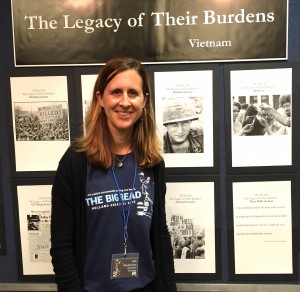sabbatical (n): a break from customary work to acquire new skills or knowledge, traditionally occurring every seventh year
Breaks Away: Sabbatical Stories of Hope
Each academic year, a number of Hope faculty take sabbatical leaves away from the college, submersing themselves for extended periods of time into their favored fields of inquiry. If viewed from above and all together, those fields would look like a calico landscape, so varied and colorful is the topography of their collective research, writing, and creative pursuits. Offering restoration and adventure both, sabbaticals are a bit like information and imagination transfusions. These breaks away from normal classroom and committee work give Hope academicians a boost to reinforce and revitalize their teaching and scholarship.
Any endeavor that goes from big to bigger requires effort, vision and good old-fashioned gumption. So when Dr. Deb Van Duinen decided to take the highly successful Hope-Holland Big Read of 2014 and create the Bigger Read of 2015, she was fortunate to have a sabbatical leave to focus her efforts and vision, but especially her trademark gumption, on the next version of bringing a community together through one book.

The Big Read is a program created by the National Endowment of the Arts (NEA) “to broaden our understanding of our world, our communities, and ourselves through the joy of sharing a good book.” Through the careful planning of program directors like Dr. Van Duinen, it provides opportunities for citizens to read and educators to lead as stories are told, meanings are found, and communities collectively react to both. With a lover of books, a specialist in adolescent literacy and English education, and a positive, energetic person like Dr. Van Duinen in charge, reading can’t help but be anything but big.
Harper Lee’s long-beloved and critically acclaimed To Kill a Mockingbird was the selection for Hope and Holland’s first Big Read in 2014, for which Dr. Van Duinen secured an NEA grant. The month-long event was so well-received (more than 3,000 Hollanders and Hope-ites participated) and the book so thoughtfully and thoroughly considered that an encore was requested. The Hope education professor determined to orchestrate another Big Read, affectionately renaming it “The Bigger Read,” with the help of a second NEA grant. This fall, Hope faculty, staff and students, along with Holland residents, will wrestle with The Things They Carried, Tim O’Brien’s weighty and award-winning book about soldiers in the Vietnam War.
Dr. Van Duinen admits that, at first, the selection of The Things They Carried made her and her Big Read committee a little nervous due to the subject matter (war) and volatile time period (the moody 1960s) of the book. But this collaborative professor heard the feedback calling for variety and selected an NEA-approved book with a dissimilar feel from last year’s familiar read. She was not about to shy away from “an opportunity to let people’s stories come through” as they read the book. “In fact,” she says, “I’m honored to be able to play a part in helping people get shaped by story.” She adds, “People were willing to listen and learn from each other’s stories last year. I have no doubt that despite the different topic and themes in The Things They Carried, this year will be the same.”
“The nature of storytelling allows us to think of our own stories too. What are the stories in our own lives? How do we refine the past? How do we tell stories to save our souls?” Dr. Van Duinen ponders. “These are questions books ask us.”
Launched this past Monday by Dr. Fred Johnson, a former Marine and current associate professor of history at Hope, with his presentation, “The Legacy of Their Burdens,” the Big Read, and thus O’Brien’s stories, will engage 15 high school teachers and their students from 10 area schools. At Hope, the book has created space for introspection and new knowledge in courses like Senior Seminar, English 113, First Year Seminar, Creative Writing and even a Latin class. And while schools are great places to talk about books, so are coffee shops, art galleries, churches, bookstores and breweries. Several of these locations around Holland will host 15 different book groups for the Big Read for the next three weeks. And of course, there is a long list of corollary events scheduled too.
Perhaps the biggest coup of all, though, for the Big Read will be a presentation by the author himself. O’Brien — whose appearance was secured by Dr. Van Duinen and the Big Read committee in partnership with the Jack Ridl Visiting Writers Series and Herrick Public Library — will give a keynote address on Thursday, November 19, at 7:00 pm at Evergreen Commons. Though his book is certainly about war and loss, it is about love and honor and memory too.
“The nature of storytelling (in books) allows us to think of our own stories too. What are the stories in our own lives? How do we refine the past? How do we tell stories to save our souls?” Dr. Van Duinen ponders. “These are questions books ask us.”
As if going from big to bigger wasn’t enough while on sabbatical, Dr. Van Duinen also published two peer-reviewed articles from her Big Read research, submitted three other manuscripts for publication, earned a grant from the Christian Scholars Foundation to study spirituality in young adult literature, and started a mother-son book club, a sentimental and scholarly project because it is where “my life as a mom overlaps with my research.”
The mothers and sons under Dr. Van Duinen literacy leadership recently finished another American classic and Big Read approved-book, Jack London’s The Call of the Wild. But of course, why wouldn’t they? Little boys can read big too.
—
Dr. Deborah VanDuinen is an assistant professor of education and Towsley Research Scholar in the Department of Education at Hope College.

